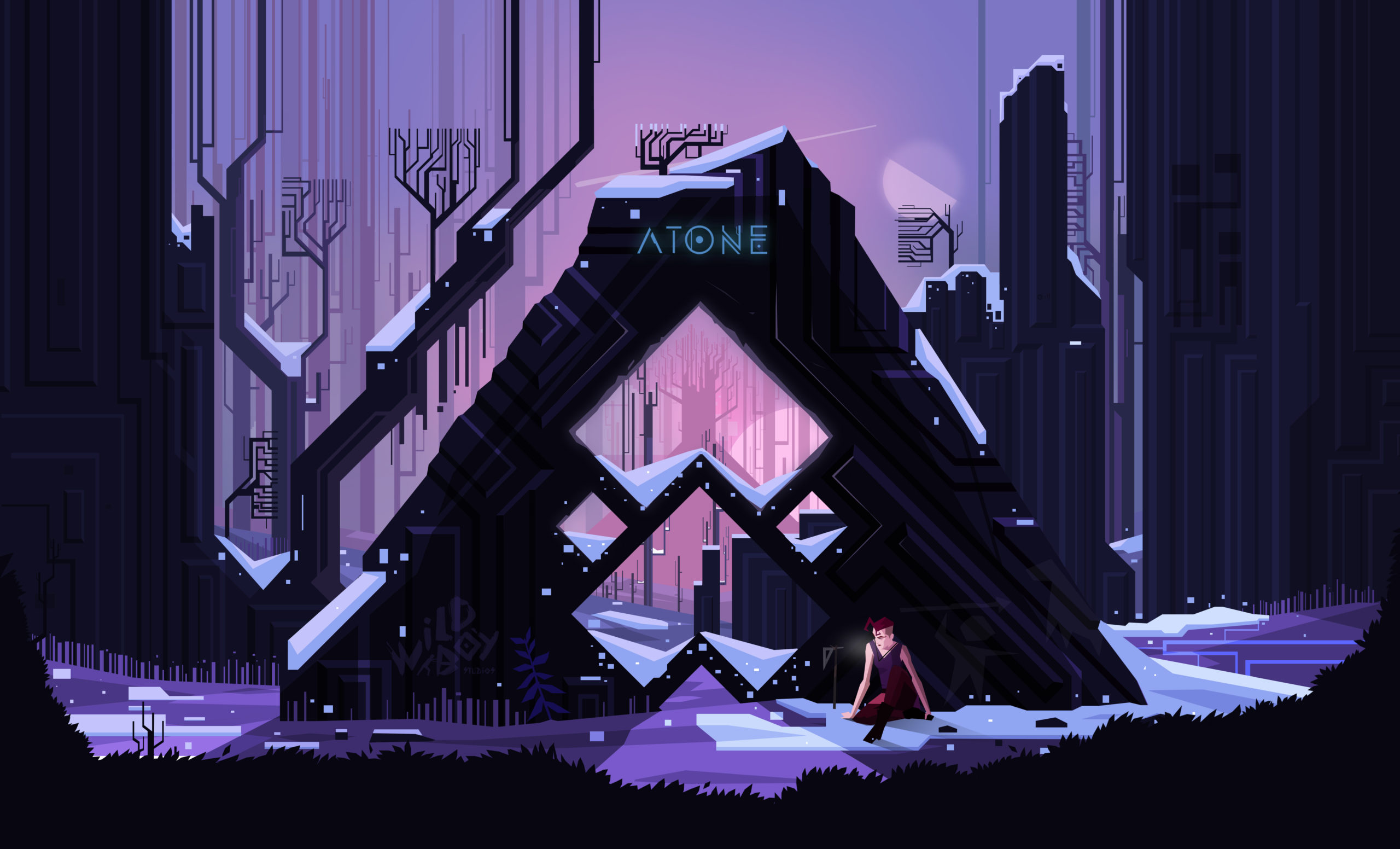Untold Tales have delivered some unassuming yet spectacular indie experiences in the past few years. From Golfclub: Wasteland, Aspire: Ina’s Tale, Arise: A Simple Story to What Lies In The Multiverse and more, they deliver smaller, wondrous indie titles with fantastic consistency.
Stepping up next to impress is Atone: Heart of the Elder Tree. Originally conceived for mobile devices, it released in 2019 on Apple Arcade, finally making its transition onto Switch in the heady post-COVID days of 2023.
Like previous Untold Tales published entries, it’s design is fundamentally accessible and streamlined, yet it retains enough in its art style, musical score, rhythm based combat and puzzling design to ensure it reaches that same high bar that’s been set, for the most part.
I’m getting ahead of myself, let’s go on a journey of self-discovery to see if Atone really does shine amongst its predecessors.
Estra-vagant Heart
Atone is heavily influenced by Norse mythology and is rooted in a number of powerful themes. The burden of grief, the pain of betrayal, the impact of loss; Despite the tale being a relatively short one, it follows the template of Aspire and Arise by channelling dark and difficult topics to create an emotional backdrop that carries the narrative.
The heavy tone is set from the off. Our hero, Estra, is now grown after a past tragedy afflicted her home and claimed the life of her father. Bound by a necklace flowing with magical energy passed down from her father, Estra must travel Midgard to reach the Elder Tree and restore balance to the land’s energy.
A curse named the Blue Vein is spreading, corrupting people’s minds and spreading violence where it flows. Using the backdrop of its Norse inspiration, Atone intertwines the fallacy of God’s like Odin and Freya with the exploration of the nature of humans and the conflicts that result.
For the most part, the story is elegantly handled. The emotional moments carried weight and felt impactful, the machinations of the Gods and their inherent flaws felt well realised and Estra is a character we connect to through her blunt refusal of the life inflicted upon her. There’s just enough levity thrown in, like through your talking frog companion Yri, to prevent things getting too overbearing.
Estra’s journey is self-contained and satisfying as a result, with a delicate mix of tough material overlaid with heart, hope and humour. Despite all the legendary names I came across, it was Estra and Yri I felt most invested in, which is a testament to the writing, even if the voiced dialogue is inconsistent.
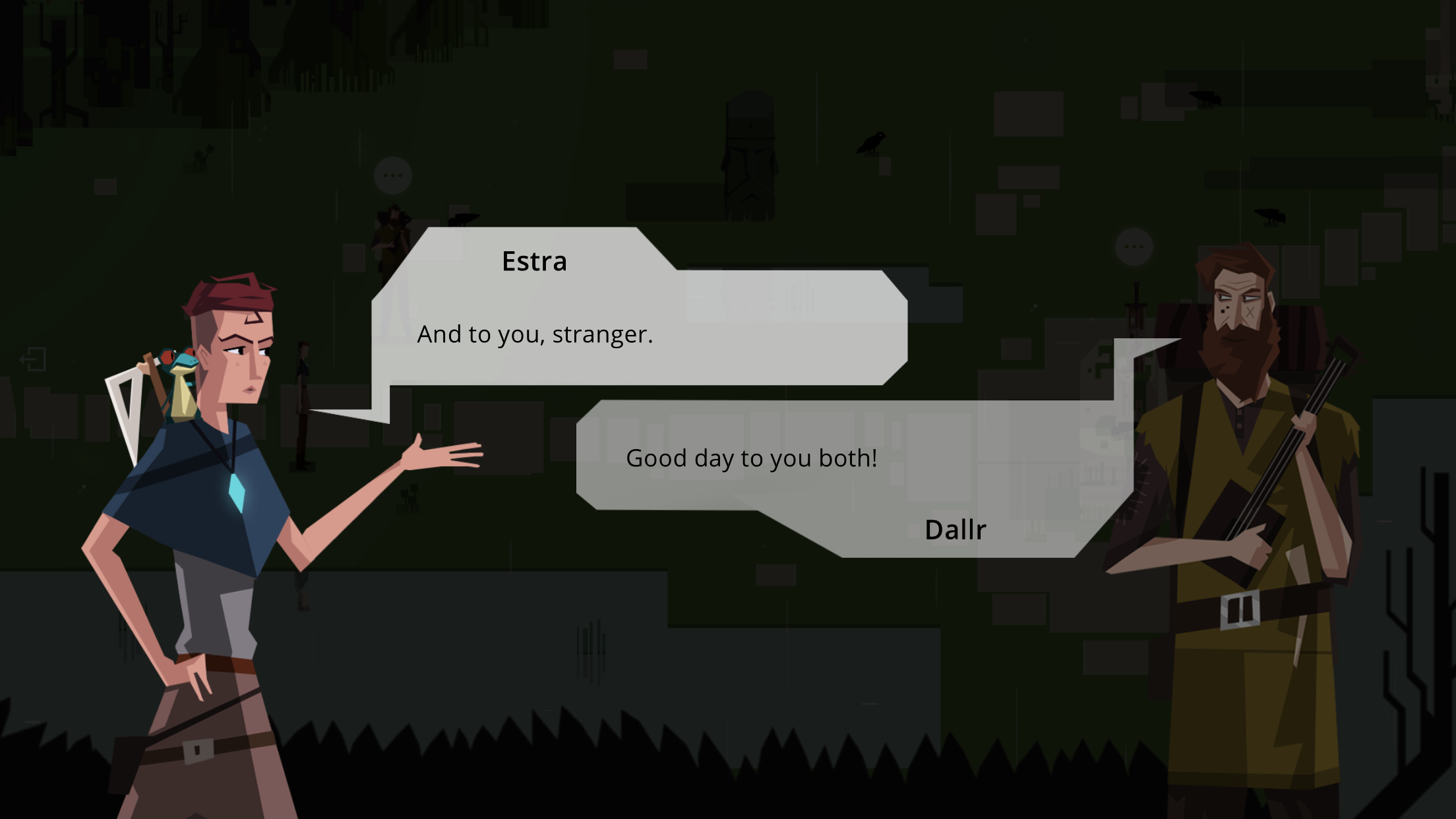
The Nine One Realm
Estra’s journey to begrudgingly save the land and her people is restricted to Midgard. Consisting of 5 main areas or levels, Atone is a tight affair, if a bit lacking in terms of level variety. The game utilises a top-down view where much of your time is spent guiding Estra through these short but semi-open spaces.
Along the way, you can interact with the locals, including the sinister snake who’ll challenge you at every turn and a nefarious stranger who’ll test your riddle solving capacity, amongst others. Almost every pathway for progress involves a puzzle, some of which are short and tepidly easy and a couple of which had me stumped for longer than I’d care to admit.
Aside from the rhythm based combat, exploration and puzzles are the bulk of the experience. There’s a pretty good variety of brain-teasers here, spanning moving tiles to complete jigsaws to time or move-limited counting tokens corresponding to shapes. Some are genuinely great while the easier ones do border on the “what’s the point here really?” side, but the creativity and endeavour for variety largely work well.
Atone also has a litany of hidden paths you can uncover, Norse statues to find and chests to open. Statues, NPC and combat encounters all provide tokens for your Odal. Foresight will allow you hints for puzzles, Protection aid in combat and Chaos help if you happen to fail a sequence and need a retry. It’s an effective way of making exploration a boon to gameplay. Currency earned from chests can be traded with a merchant for health upgrades and a couple of other goodies, which is nice.
Estra’s navigation is never particularly challenging but the occasional riddle, puzzle or NPC interaction you find off the beaten path can be rewarding. It’s an accessible approach that even if it is lacking an extra bit of depth, I still enjoyed the basic structure.
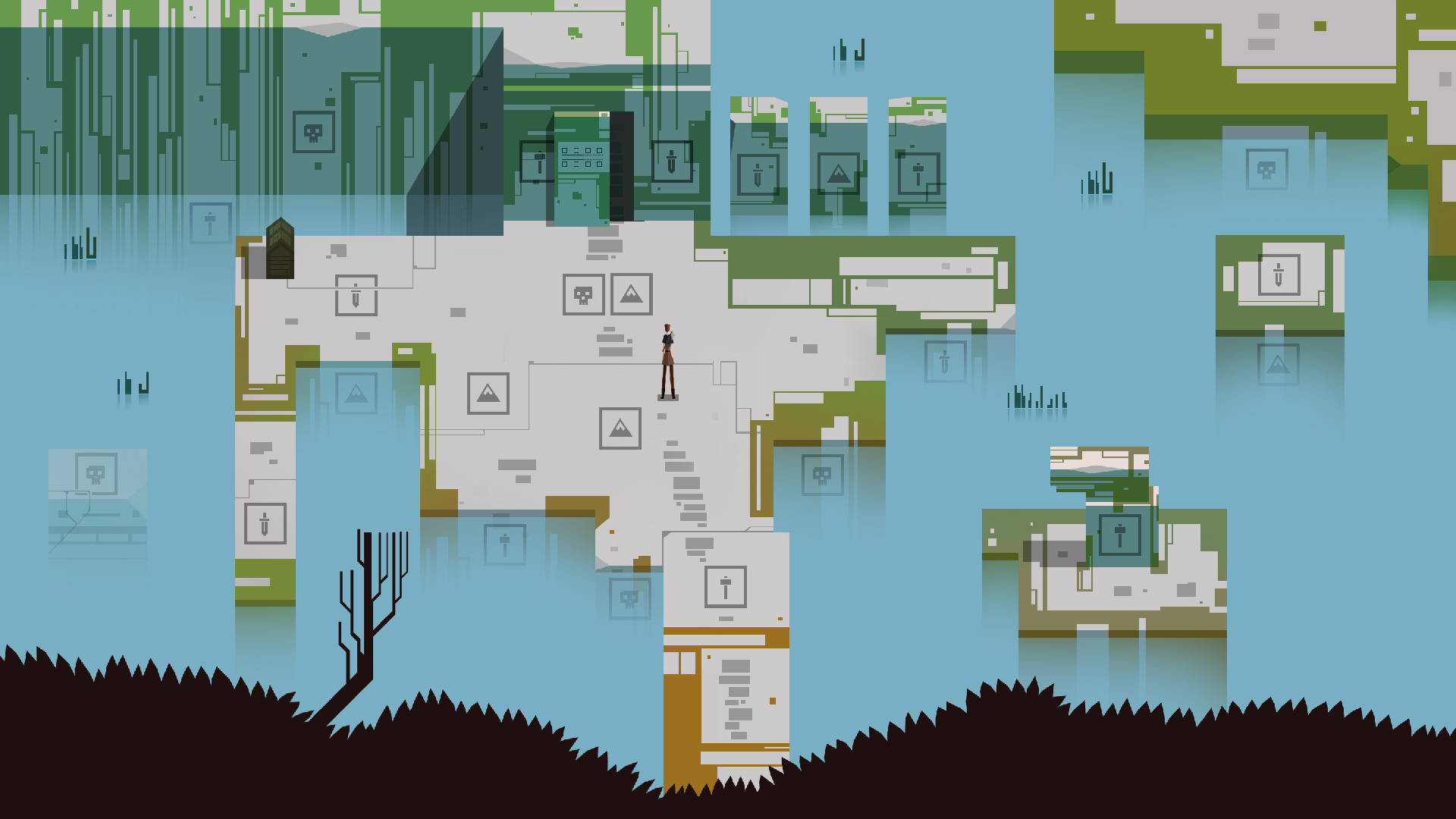
The Flow of Battle
I mentioned the rhythm based combat before so let’s break down what that actually means in gameplay. Combat isn’t really the main draw of Atone, owing to the fact that through a handful of contextual choices, you can skip stories encounters and entirely miss optional side battles. Which is a shame, because the rhythm-based system is really fun.
If you imagine a Guitar Hero track but with a beautifully rendered and animated Nordic battle sequence going on in the background, you’ll be on the right lines. Atone has 3 difficulties: story, which has no button inputs required. Normal, which uses down on the directional arrows and B on two separate tracks. Then hard, which uses Left and Down, B and A across 4 tracks.
During an encounter, you need to hit the input at the same time as the glowing white shape. Miss too many in a row and you’ll witness Estra take a hit, depleting her health. Hit more notes than you miss or keep up a good sequence, Estra will gracefully smash her opponent with her trusty axe.
There’s no deep complexity or any other factors to be conscious of, just hit the notes. I started on Hard, and quickly had to drop due to the sheer numbers of notes I was missing when frantically smashing the buttons. I must have looked like Hulk trying to thread a needle, honestly. What Atone lacks in depth, the combat system makes up for with sheer ferocity and speed. Which isn’t a complaint, as the flow of the system works superbly.
The input window is relatively forgiving, the notes are synced perfectly with the music and there’s a great balance between having nimble dexterity and forgiving leeway to ensure you don’t fail from a handle of misses. It’s a rewarding system and while the story only has a couple dozen fights, an arena mode opens up post-completion that allows you to hit high scores and enjoy the system to your heart’s content. All-Father be praised.
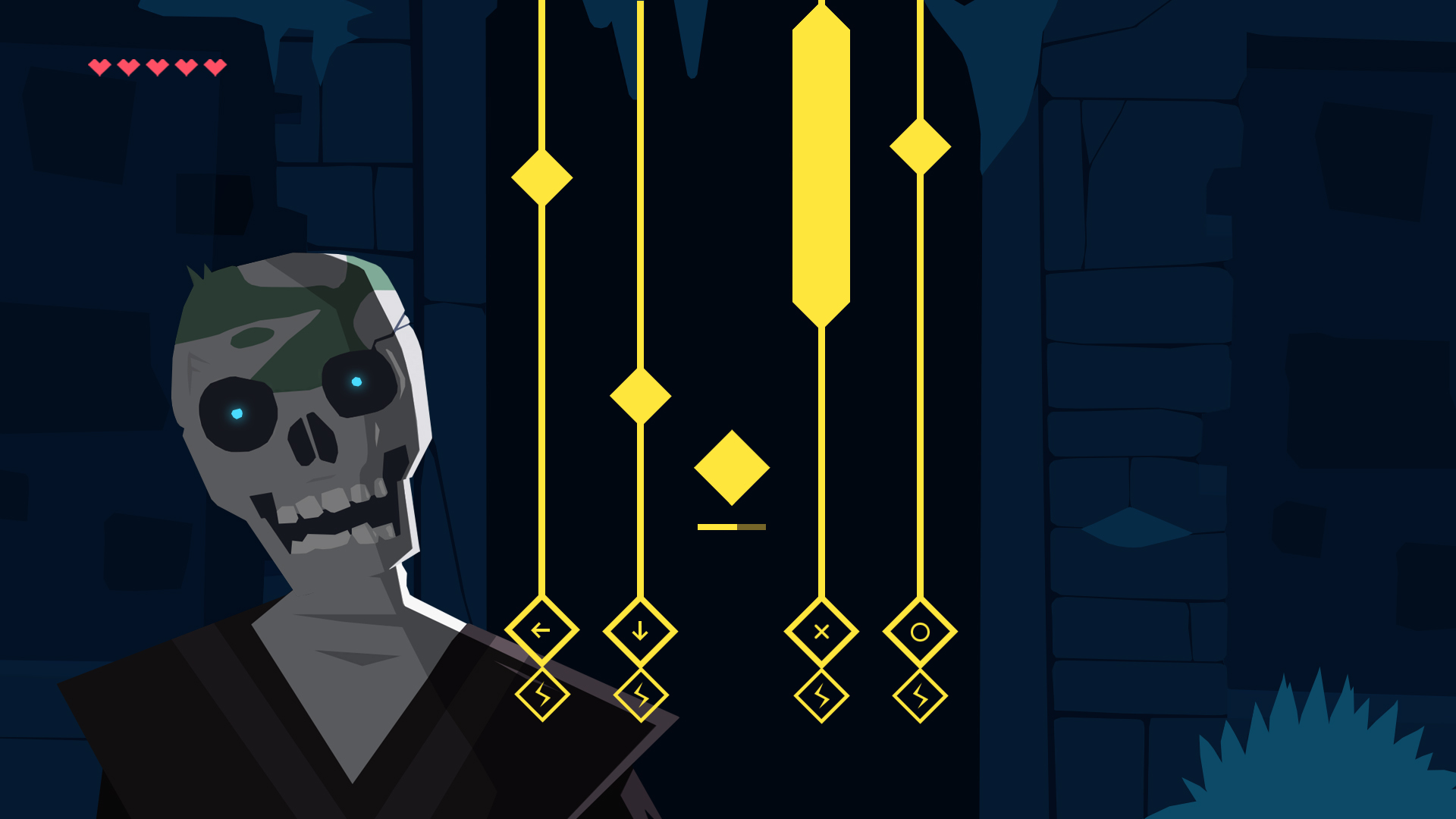
Tree of Beauty
As with almost all Untold Tales’ published games, the standout element of Atone is the visuals and musical score. Wildboy Studios drew a lot of inspiration from Genndy Tartakovsky (of Samurai Jack and Clone Wars fame) to produce the animations and environments and the talent on display demonstrates this superbly.
While relatively minimalist in terms of detail and pixel count, Atone makes excellent use of vibrant texturing and shades of colour to add depth to the spaces of Midgard. Venturing through a dimly lit cave network, ascending the snowy climbs of the mountain range or loping around a quaint village all feel immersive thanks to the brilliant art style.
Being a rhythm game further means having to nail the sound for a rewarding experience and Wildboy Studios have delivered here too. Many of the tracks in combat have an energetic base to them, both making the music an ear-worm as well as easy to mash the buttons in-sync to. It’s a deft balance to achieve and I found myself sometimes not even needing to see the notes to know when to hit them.
I wouldn’t say the visuals did as much as Golfclub: Wasteland nor does the soundtrack stand out as one to listen to outside of the game itself, but what’s here is brilliant and fully deserving of praise.
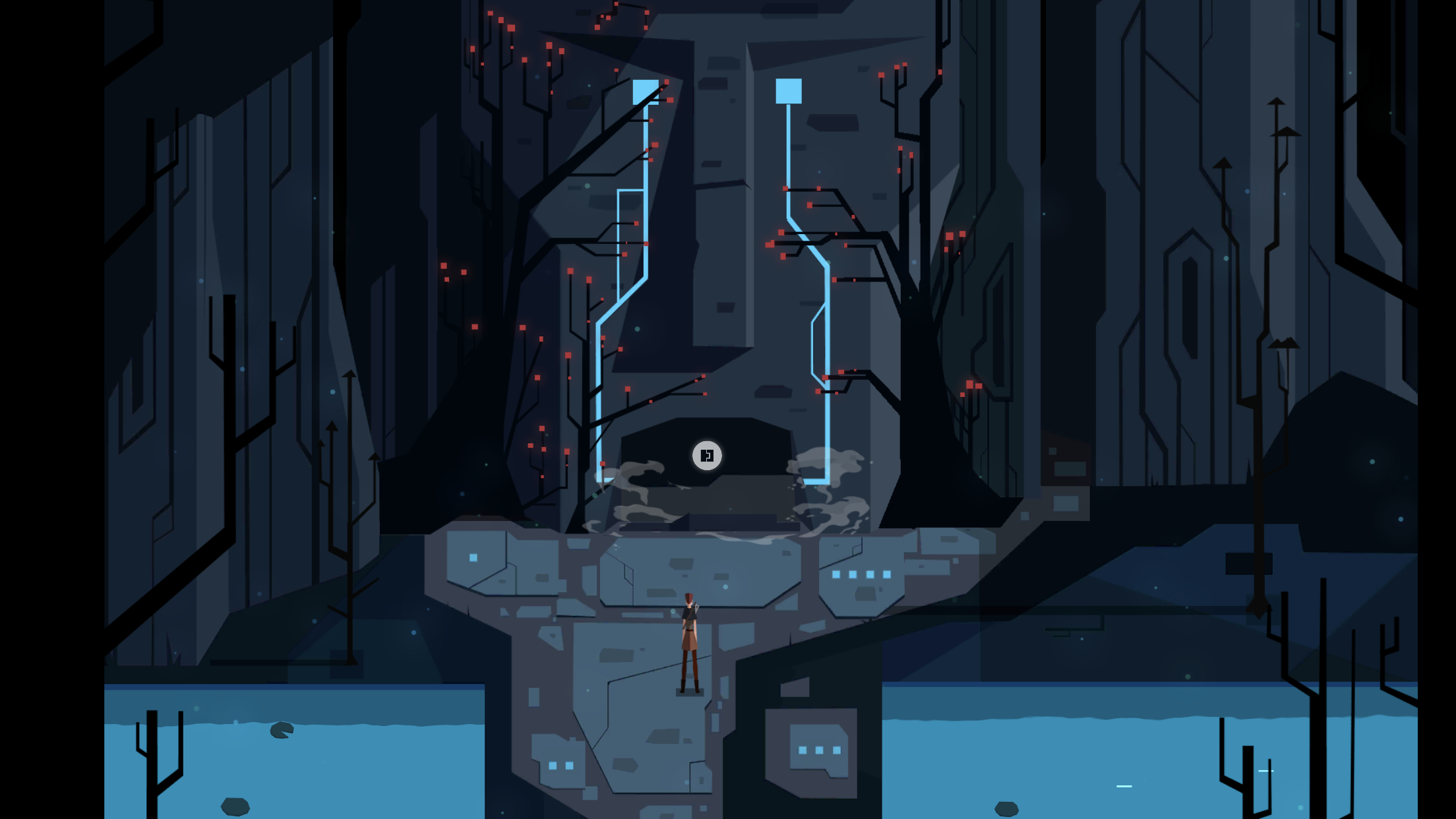
Atonement Not Needed, Yet Achieved
Atone: Heart of the Elder Tree is another clever and subtle twist on adventure-fare that’s typical of Untold Tales’ portfolio. Wildboy studios have delivered a thematically deep and simplistically rewarding gameplay experience.
My playthrough clocked in at around 4 hours, but I certainly missed a few secrets, messed up a couple of one-chance puzzles and only reached one of the available endings. As there’s a variety of paths to shape Estra’s journey you can explore, there’s a hearty amount of replayability available to those who want to immerse more into this dark yet compelling Norse world.
I finished Atone: Heart of the Elder Tree much the same way I did Aspire: Ina’s Tale. It’s a short, compact but wholly fulfilling package that’s well worth diving into, even if the rhythm based combat and RPG elements feel as light as Freya’s touch.
Wildboy Studios’ Norse-inspired rhythm combat RPG is captivating thanks to a bright art style juxtoposed against a dark, deep and loss-filled narrative. While fun, the combat, puzzling and exploration don’t quite reach the same levels, but have more than enough to be worthy of your time. No atonement required, Estra’s journey needs no redemption to be recommended.

Atone: Heart of the Elder Tree is available January 27th on Nintendo Switch (review platform).
Developer: Wildboy Studios
Publisher: Untold Tales
Disclaimer: In order to complete this review, we were provided with a promotional copy of the game. For our full review policy, please go here.
If you enjoyed this article or any more of our content, please consider our Patreon.
Make sure to follow Finger Guns on our social channels –Twitter, Facebook, Twitch, Spotify or Apple Podcasts – to keep up to date on our news, reviews and features.
